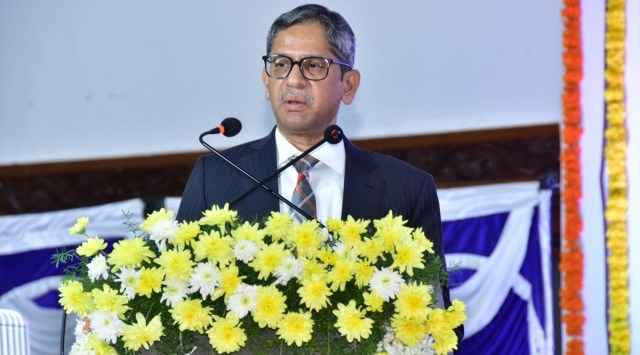Stating that “actions and inactions of the CBI have raised questions regarding its credibility in some cases”, Chief Justice of India N V Ramana underlined Friday the need to set up a statutory, independent institution which could bring under one roof the CBI and other agencies like Enforcement Directorate (ED) and Serious Fraud Investigation Office (SFIO). This, he said, would end multiplicity of proceedings and save them from being blamed as tools of political harassment.
Delivering the 19th D P Kohli Memorial Lecture on ‘Democracy: Role and Responsibilities of Investigative Agencies’ — it is named after the founding Director of the CBI — at Vigyan Bhawan in New Delhi, CJI Ramana said the “need of the hour is to reclaim social legitimacy and public trust” and “the first step to gain the same is to break the nexus with the political executive”.

India’s experience so far, he said, has proven that democracy is best suited “for a pluralistic society like ours” and “our rich diversity cannot be sustained through dictatorial governance”.
Story continues below this ad
“When it comes to the CBI, it possessed immense trust of the public in its initial phase. In fact, the judiciary used to be flooded with requests for transfer of investigations to CBI as it was a symbol of impartiality and independence. Whenever the citizenry doubted the skill and impartiality of its own state police, they sought investigation by CBI as they wanted justice to be done,” he said.
“But with the passage of time, like every other institution of repute, the CBI has also come under deep public scrutiny. Its actions and inactions have raised questions regarding its credibility in some cases… There is an immediate requirement for the creation of an independent umbrella institution, so as to bring various agencies like the CBI, SFIO, ED, etc. under one roof. This body is required to be created under a statute, clearly defining its powers, functions and jurisdictions,” he said, adding that “such a law will also lead to much needed legislative oversight”.
Stating that the umbrella body should be headed by an “independent and impartial authority”, the CJI said the appointment must be made “by a committee akin to the one which appoints the Director of the CBI. The head of the organisation can be assisted by deputies who are specialists in different domains”.
“This umbrella organisation will end multiplicity of proceedings. A single incident these days gets investigated by multiple agencies, often leading to dilution of evidence, contradiction in depositions, prolonged incarceration of innocents. It will also save the institution from being blamed as a tool of harassment. Once an incident is reported, the organisation should decide as to which specialised wing should take up investigation,” he said.
Story continues below this ad
“Police and public order being in the State list, the burden of investigation is primarily on the state police and there is no reason why state investigative agencies cannot enjoy the same level of credibility as that of the national agency,” he said, adding that “the Central law for the umbrella investigative body… can be suitably replicated by the states”.
Tracing the evolution of the Indian police system, he said “there is no doubt that the Imperial Police, created by the colonial masters, was modelled to subdue and control the Indian citizenry” and that “the misuse of police by political masters is not a new feature”. Post-independence reforms within the police forces, he said, have not been up to popular expectations and “people hesitate to approach the police in times of despair”.
“The image of the institution of police is regrettably tarnished by allegations of corruption, police excesses, lack of impartiality and close nexus with the political class,” he said, adding that police officers often approach courts with the complaint that they are being harassed after a regime change. “When you try to endear yourselves to the powers, you will have to face the consequences.”
He said “it is essential that all institutions, including the police and the investigative bodies, uphold and strengthen democratic values” and “not allow any authoritarian tendencies to creep in”. He also pointed to the need for more women representation in policing so that women victims feel confident to approach and report crimes.









